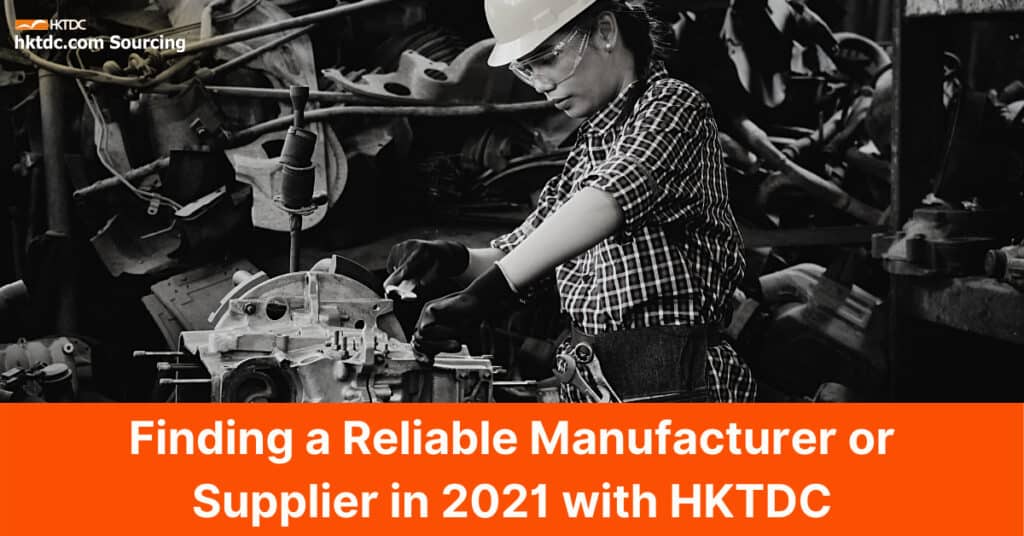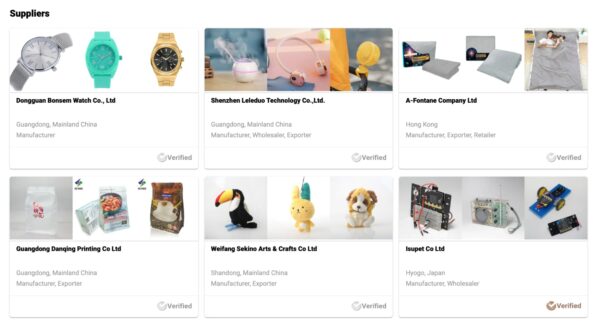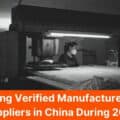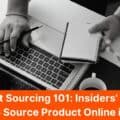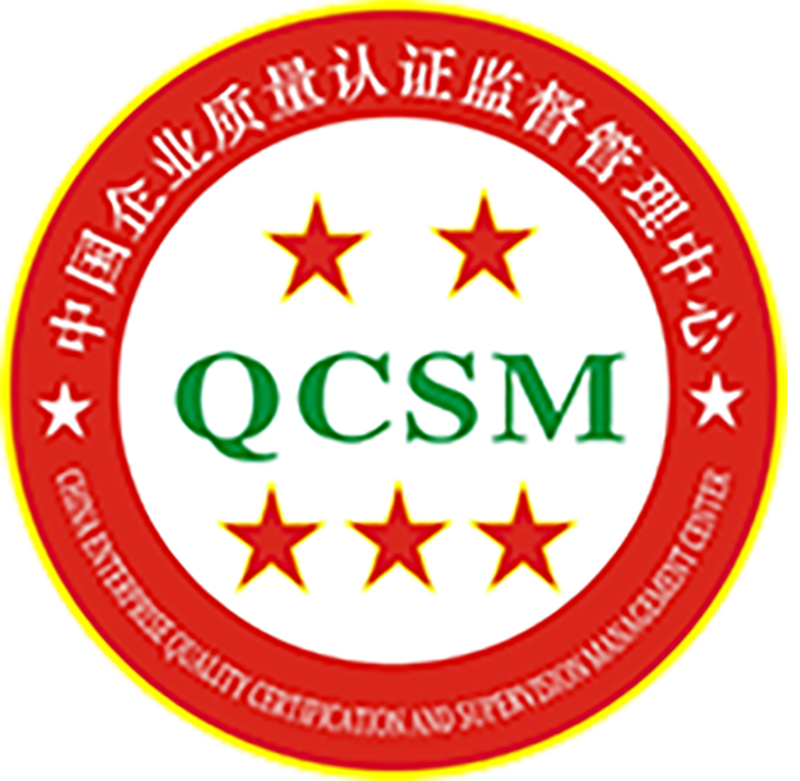Introduction
You have your product idea. Now, how to find manufacturers or find suppliers to give you that?
When starting a business, you may have brainstormed some ideas of your own, like capitalizing on one of the many in-demand products already on the market.
Traders will find themselves stuck when it comes to actually source the products. When you plan on manufacturing something of your own, or look to find suppliers for wholesale purchase, it’s not always easy to find good products.
To help you find manufacturers or find suppliers, this post will cover the basics. We’ll provide you with all the ideas for some places to search. This includes the tactics for you to approach suppliers and what you will need to ask when developing a product for your eCommerce business.
Is a manufacturer a supplier?
Suppliers and manufacturers work synonymously. When we refer to suppliers, we’re referring to anyone that will supply you with products and inventory. This shares the same definition as manufacturers, wholesalers, and distributors.
There are a ton of helpful resources online that you can Google on the internet. Before you start to find manufacturers, there are a few crucial things you need to know and decide on.
To begin with, you have to figure out what type of supplier you’re looking for. Understanding the supplier type you need will guide your research. There are several supplier options, the most common being:
- A manufacturer who executes the production of your own product
- A supplier (who may also be a manufacturer), wholesaler, or distributor who purchases products of already-existing brands and items that support your requirements
- A dropshipper that supplies products and fulfills orders of already-existing brands and products
Domestic Vs. Overseas Manufacturers
One of the first vital decisions you’ll have to make when producing your product is whether you’ll manufacture locally or outside your country.
Manufacturing outside your country would refer to the outside (but commonly amongst other Asian) countries such as China, India or Vietnam. These countries are known to have relatively lower manufacturing costs.
However, low-cost manufacturing isn’t exclusive to Asia. There are affordable manufacturers across Latin America, Eastern European, and African countries as well.
The product you want to manufacture will be affected by location options. Some products can be easier and cheaper to produce in certain parts of the world. This depends on the source of raw materials, expertise and such.
Before you start to find manufacturers or find suppliers, there are many considerations that need to factor in. Both domestic and overseas manufacturing have their advantages and disadvantages:
Advantages of Domestic Manufacturing
- Higher manufacturing quality
- Easier to communicate
- Can do on-site visits more frequently
- Manufacturers can be easily verified
- Cheaper and faster shipping
- Improved labour, ethical and environmental standards
- Greater security regarding payments and intellectual property
- Locally manufactured products have an increased marketing appeal
- High intellectual property right protection
- Greater payment security and recourse
Disadvantages of Domestic Manufacturing
- Manufacturing costs are usually higher
- Fewer manufacturers to choose from
- Limited product options (Some manufacturers don’t manufacture products in Asia at all)
Advantages of Overseas Manufacturing
- Lower manufacturing costs
- A higher number of manufacturers to choose from
- One-stop services like Alibaba have made it easy to find suppliers
Disadvantages of Overseas Manufacturing
- Products may be of lower quality and harder to verify beforehand
- Language, time zone and cultural barriers affect communication
- Difficult and expensive to visit manufacturing site
- Shipping may be more expensive and take longer
- Less security and legal recourse regarding payments and intellectual property
- Importation and customs laws can be tricky
- Lower labour, ethical and environmental standards
- Less overall oversight
Crosscheck Your Manufacturer’s Quality
One common fear that small business owners have is the factory’s credibility and final product quality. This is especially true in the context of manufacturing a product for the first time/ It’s a normal situation that shouldn’t be a surprise. Working with less experienced manufacturers can bring harm to your business,
Once you have a list to find suppliers, identifying their credibility and ensuring their quality for good manufacturing is the next step. It’s important to properly inspect all your options before coming to a decision. As you find manufacturers, anything that looks suspicious should definitely be cut off.
Looking for reviews or endorsement
Finding out the reputation of a business place starts from reviews. However, reviews are not always available or easy to discover.
Looking up the supplier in various directories is a great lead. When you find your manufacturer on any a paid directory websites, such as hktdc.com Sourcing, Alibaba.com, or AliExpress, it will be quick to find.
The factory’s respective website may also have reviews. While they are likely only to contain positive reviews, you may be able to find and reach out to other customers of theirs to inquire about their experience personally.
Last but not least, the manufacturer’s social media accounts are a reliable place to see customer’s reviews. You may be able to find reviews or random posts that can shed extra light on the supplier.
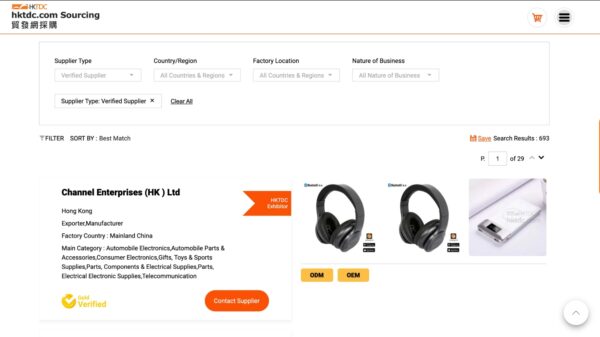
Inquire about the experience with your type of product
When research is done, you should be ready to approach your next potential manufacturers.
You will want to be sure of their capabilities of manufacturing your product. Inquire about their experience with similar products and ensure that they can fulfill your requirements.
Your potential manufacturer may be able to refer you to satisfied customers of theirs. Don’t be shy when it comes to asking questions. Speaking to as many people as possible and get the best idea of what that manufacturer is capable of. That way you would be in the know for your competition.
Ask for a copy of business license from the manufacturer
Acquiring a copy of your manufacturer’s license will help you understand the important pieces of information for your business:
You will discern whether they are a legitimate business with proper credentials. This may sound extreme; but is especially crucial for overseas relationships.
Most business licenses will include their scope of operation. This involves a range of activities the business is legally allowed to participate in.
Business licenses will also have additional information on the manufacturer, such as a license number. You can use this to do some more in-depth online research if you’re still skeptical about them. Other certification may be needed for the types of products to be sourced. Do consult the relevant government departments or testing/certification companies for more information.
Request product samples
When you find that one reputable manufacturer, you need to ensure the quality of the product you want to produce before you make the order. Requesting a product sample occurs in this step.
Misinterpretations can often happen in the real manufacturing process. Your product’s design can be unfilled, incomplete or even be produced poorly depending on the factory. Sometimes they might even take liberties on design decisions.
It’s much safer to discover these problems by requesting a product sample, over having a full batch of poorly-produced products that cannot even be up for sale.
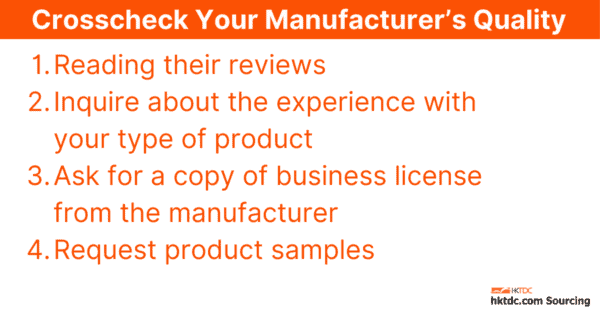
Request a Quote
When you secure a few manufacturers, you can start requesting formal quotes.
There are a few vital pieces of information you need to make sure you receive:
- Price per unit
- Turnaround time
- Payment terms
- Minimum order quantity
Price per unit
The price per unit is extremely important. It is the basis of your expenses and has a huge effect on your profit margins.
Be sure to inquire about prices for different order sizes as well. Ordering 100 units and ordering 10,000 units will likely result in wildly different fees. You will need to manufacture your products in the most cost-effective way possible, so secure the estimates of those prices beforehand.
Turnaround time
This refers to the time it takes to manufacture your order. Be sure to ask about the duration for different bulk sizes. Knowing this will help ensure you better manage your inventory during seasonal shifts in the market.
Payment terms
Payment terms can have an impact on your decision, especially when making large orders.
You will often only start generating income right after your products have arrived. Some manufacturers do allow you to pay through installments, and others will require full payment upfront.
Be sure to know how you’ll be paying before making an order.
Minimum order quantity
It is a common misconception that the most important thing is manufacturing price. In fact, it is very critical to find out the minimum order quantity over anything.
When you find manufacturers, this number varies. You may find some factories’ minimum order to be too large scale for you.
Make sure you can handle the minimal quantity, or move on and find other suppliers.
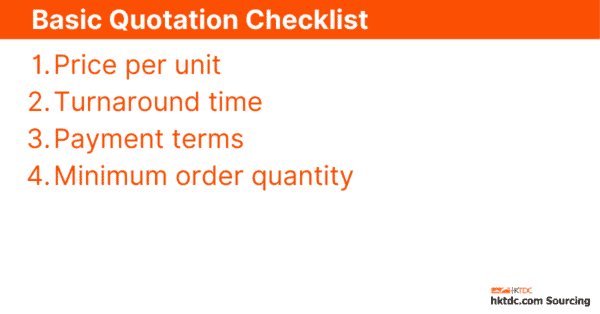
Tips for negotiating lower MOQs
Being flexible in manufacturing with smaller quantities of goods and more cash will always be a safe route.
Here are some tips that may help you negotiate a lower MOQ.
Using Your Annual Forecasted Sales Quantity
It’s important to paint the bigger picture. Negotiate from the position of a head, structure how your business will entail in the coming year. This is where the strategy falls on how much you buy within a year.
Negotiating with an annual volume carries two powerful effects:
1) It shows that you have done your homework and you have a PLAN to sell;
2) The effect of an estimate using an annual figure will make the number look way more powerful
For example, 1 month of estimated sales could be very close to 1 month of the actual sales.
But 1 month of estimated sales x 12 could be much more than your actual annual sales.
Painting an annual volume picture with big bold brushes will secure you the best quote.
Another tip is to take advantage of the window of opportunity. Negotiate with your supplier for a NEW product price. Nobody has a crystal ball to see the future. It’s not lying – you are estimating from a business point-of-view.
The unit price negotiated based on the annual estimate will be better than the price negotiated on your first purchase quantity.
Leverage on Your Product Knowledge
If you have the expertise and rather deep knowledge of your product, it’s the perfect opportunity to use it as an advantage.
Share your background with the supplier so they know they can’t fool you.
Here’s a warning for the product experts:
Don’t be misled by your own knowledge. If you ask your supplier, “CAN you do this?”, and all they say is “yes” – which is the case most of the time – it’s actually not clear if they are telling the truth.
It’s not safe to assume that a supplier’s direct “yes” is a true yes. Instead, you should frame your question to something like “HOW do you do this …”, without properly disclosing your knowledge.
Your own knowledge is yours to keep; their capabilities are up to them. You need to let the supplier prove their abilities to you. Using your own knowledge is a leverage material, not something that should be used for training.
Here’s a tip if you’re not a product expert. Don’t worry, you can educate yourself on the market trend, selling price range, material specifications, material price index and many more.
Combining what you’ve learned from the suppliers and your own research can quickly acquire a lot of knowledge. The more knowledge you can demonstrate, the more leverage you have.
Order at the Right Time
Every manufacturer across all industries has his busy and slow times. If you are not playing the role of a huge client to a manufacturer, be a timely one. It’s all about careful planning for when you place your orders.
This can go a long way in reducing not only your order’s MOQ, but also the price since it’s a regular supply and demand. Be sure to avoid ordering around special holidays so you wouldn’t be a tiny potato in a large field.
Build Relationships
Like every other business, building relationships is key. Manufacturers play a critical role in having your business move forward. Be sure to develop a strong working relationship.
One advantage of working with experienced manufacturers and suppliers can lead to a long-standing kind, benefitting your business for the longer term.
When establishing a good relationship, it can even help in the negotiation process. Leading to potential perks such as much lower MOQs, or easier prices that can simplify the production process even further.
Conclusion
As entrepreneurs, capitalizing on one of the many in-demand products already on the market would require taking the right steps.
You’ll need the right terminologies, tactics, and proper research to keep yourself on the foot of the current supplier & manufacturer market.
It starts with a decision on manufacturing locally or overseas. Before making that vital step, we need to make a comparison of their advantages and disadvantages, as described above.
After that, you will need to verify the quality of these manufacturers. In particular, you want to find the right supplier for your business workflow.
Then it goes to the negotiation stage. Ask for the right quotes through surveying the shortlisted suppliers. There are important terminologies to keep in mind, such as price per unit, turnaround time, payment terms and minimum order quantities.
While negotiating, there are essential tips to consider: presenting your annual sales forecast, using product knowledge as leverage, ordering at the right time and building relationships.
With all these important factors, you will be on your way to playing a pivotal role in the manufacturing and suppliers industry as an entrepreneur.
Should you need further guidance, visit HKTDC for more in-depth business guides. The wide array of country profile-based guides thoroughly covers the basics you must know before trading with suppliers from the respective countries, from custom regulations to payment methods.


